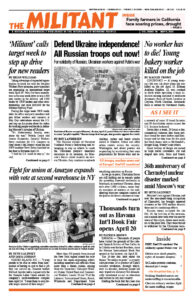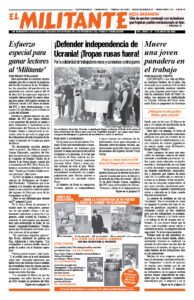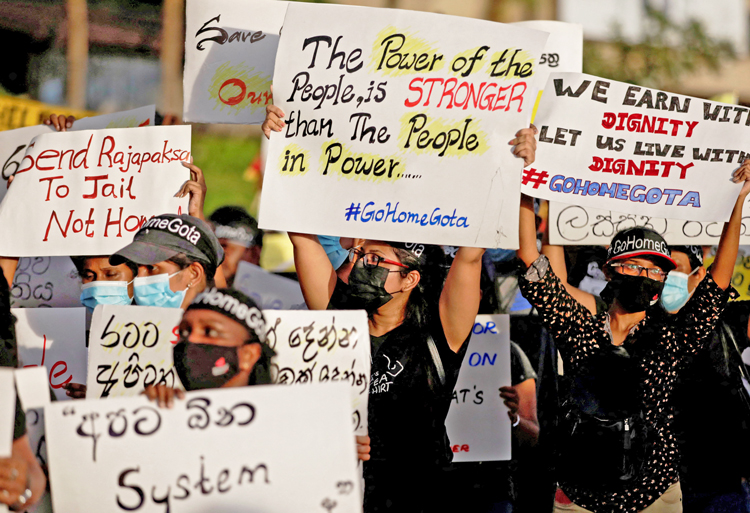Weeks of protests by tens of thousands of workers, farmers and youth continue across Sri Lanka, demanding President Gotabaya Rajapaksa resign. Soaring inflation, spreading power outages and shortages of food and fuel are devastating millions, as the country’s rulers put the burden of their skyrocketing debts on the backs of working people.
Police opened fire on unarmed protesters in Rambukkana April 19, killing one and wounding 14 others. Chaminda Lakshan, a 42-year-old father of two, was killed as he waited in line for gas. The protest was one of many after the country’s main gas retailer, state-run Ceylon Petroleum, hiked prices by nearly 65% the previous day.
Doctors at Sri Lanka’s main children’s hospital protested April 19 over the severe shortage of medicines and equipment. University students marched on the president’s home April 24.
For more than two weeks, thousands of protesters have camped outside the president’s offices in Colombo, the capital. Demonstrators have set up a camp dubbed “Gota-Go Village” vowing not to leave until the president steps down.
Dilani Niranjala brought her family to the camp April 14, Sri Lanka’s New Year’s Day. She said her sons “must see the truth,” showing them the scale of the protests that have brought together people across ethnic and religious lines.
‘They can’t divide us anymore’
“Nobody brought us here. We organized ourselves,” tea farmer Charith Weliwatta told the press at the camp. “Tamils, Muslims, Burghers, Sinhalese, we are all here. They can’t divide us any more.” Weliwatta said he cannot get hold of fertilizer he needs for the two acres he farms.
Government lockdowns during the COVID pandemic gutted the country’s tourist trade. Today’s fuel price hikes, exacerbated by Moscow’s war against Ukraine, have added to the crisis. The ruling Rajapaksa family is widely despised for their disdain of the increased hardships foisted on workers and farmers and widening inequality.
In April 2021 the government banned chemical fertilizer imports, saying it favored organic farming, with no discussion with farmers or any plan on how to replace the nutrients. The move devastated tea and rice harvests. The ban was lifted in November after months of protests by farmers and a surge in food prices. Farmers continue to struggle, squeezed by shortages of fertilizer and the steep increase in diesel costs.
Just as devastating is the impact of $4.8 billion in high interest loans from Beijing taken on by former President Mahinda Rajapaksa, brother of the current president, to lavish funds on his pet projects. The Mattala Rajapaksa International Airport, which opened in 2013, has earned the reputation as the least-used airport in the world. The airport is a daily flight or two away from being completely defunct. Unused terminals are now used for storing rice, and elephants roam on the tarmac.
In 2015, after the government couldn’t repay another loan to Beijing, the country’s main seaport and 15,000 acres of land around it were ceded to Chinese control for the next 99 years. The Chinese rulers’ Belt and Road Initiative is expanding infrastructure along trading routes to facilitate exports from their rapidly growing industries, tying governments across the region into debtor relations with Beijing.
The Sri Lankan government is on the brink of bankruptcy with nearly $7 billion of its $25 billion in foreign debt due for repayment this year.
Gotabaya Rajapaksa continues to maneuver to try to stay in office. On April 18 he swore in a new 17-member cabinet, with most posts filled by members of his ruling party, Sri Lanka Podujana Peramuna. The country’s previous cabinet — except for Mahinda Rajapaksa, now prime minister — resigned April 3.
The country’s influential Buddhist clerics have joined the growing list of former Rajapaksa allies calling on him to quit. Dozens of lawmakers quit the president’s party April 19 and took seats on opposition benches in parliament. None of the opposition parties offer an alternative to the course pursued by the Rajapaksa government, let alone any proposals to protect the living standards and livelihoods of working people.
The government began talks with the International Monetary Fund April 18 to secure up to $4 billion in new credit. A week earlier the government suspended payments on foreign loans. Trading on the Colombo Stock Exchange was suspended for two weeks.
The IMF insists any deal requires assurances that payment of government debts can be put on a “sustainable path” and that any aid “should be designed to resolve Sri Lanka’s acute balance of payments problems.” In other words, its top priority is for debt payments to wealthy bondholders to continue. Any deal will require the government to commit to tax hikes and spending cuts that will deepen the crisis for workers and farmers.
The government is also trying to borrow $1 billion more from Beijing to repay existing Chinese loans due in July.


